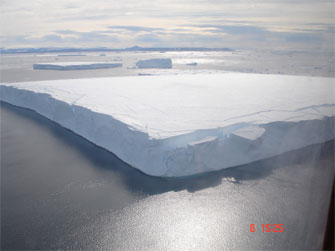Antarctica is melting finds study
Rhett A. Butler, mongabay.com
March 5, 2006
The Antarctic ice sheet continues to shrink according to a NASA study released last week.
Using data from the Gravity Recovery and Climate Experiment (GRACE) scientists concluded that Antarctica’s ice sheet decreased by about 152 cubic kilometers annually from April 2002 to August 2005, or about 36 times the annual amount of water used by the city of Los Angeles, or 3 months of total water consumption in the United States.
Researchers at the University of Colorado at Boulder say that the melting of the Antarctic ice sheet—which holds about 90 percent of Earth’s ice and 70 percent of the planet’s fresh water resources—accounted for about 13 percent, or around 1.2 millimeters, of the overall observed sea level rise for the same period.
“This is the first study to indicate the total mass balance of the Antarctic ice sheet is in significant decline,” said Isabella Velicogna of CU-Boulder’s Cooperative Institute for Research in Environmental Sciences, lead author of the study that appears in the March 2 online issue of Science Express.
 A floating iceberg off the Antarctic Peninsula. Photo courtesy CU-Boulder National Snow and Ice Data Center. |
Most of the ice loss occurred in the West Antarctic ice sheet. According to researchers from the British Antarctic Survey, the melting of the West Antarctic ice sheet alone—which is about one-eighth the volume of the East Antarctic ice sheet—would raise global sea levels by more than 6 meters (20 feet).
The latest findings contradict predictions made by the 2001 Intergovernmental Panel on Climate Change assessment which anticipated increases in Antarctic ice sheet due to higher levels of precipitation in a warming climate.
The Antarctic study mirrors research released last year by NASA showing a significant decline in Arctic sea ice in the northern hemisphere.
This article used information from the University of Colorado at Boulder.